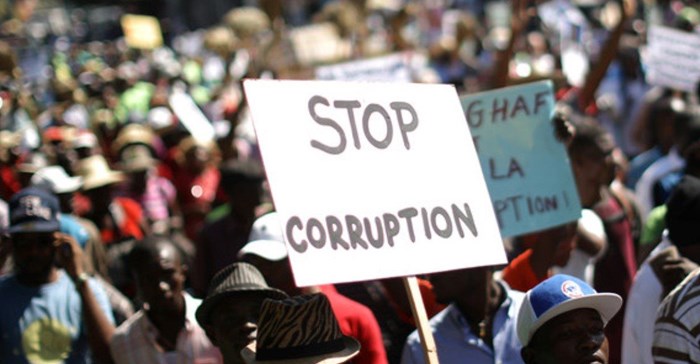South Africa slips one point in the rankings of the global index measuring perceptions of public-sector corruption around the world.

Source: Reuters.
This is according to Transparency International’s 2022 Corruption Perceptions Index (CPI) which was released today.
South Africa has barely shifted position on the CPI over the 11 years that Corruption Watch, Transparency International’s (TI) local chapter, has been tracking its progress.
Now ranked at 43, the country is back where it started in 2012, with very little upward movement over the past decade.
It is important to note, however, that the CPI measures perceptions of corruption, and not actual corruption that is experienced in countries across the world. In this regard, perceptions may differ from the current reality in South Africa, where there has been some forward momentum by law-enforcement agencies in curbing and combating corruption.
Using data from 13 external sources reflecting the views of country experts and surveys of business people, the CPI ranks 180 countries and territories around the world based on perceptions of public-sector corruption on a scale of zero (highly corrupt) to 100 (very clean).
The global average remains unchanged at 43 for the 11th year in a row, indicating that more than two-thirds of countries score below 50 and thus have a serious problem with corruption, and most countries have made little to no progress in tackling corruption in more than 10 years.
The 2022 report paints a disturbing picture of an increasingly dangerous world, highlighting the link between corruption and conflict globally, and the threat that corruption poses to peace and security.
The recovery from the Covid-19 pandemic, the climate crisis, and growing security threats can be said to be at the root of a new wave of uncertainty and greater instability in the world in general.
“The annual CPI represents an opportunity for countries to redeem themselves by demonstrating a tangible shift in addressing their corruption problems. However, we are assailed each year by the failure of governments, our own included, to be seen to be advancing anti-corruption efforts,” said Karam Singh, executive director of Corruption Watch.
“The fact that South Africa has slipped a point at a time when there appears to be some momentum in bringing the corrupt to book, following the findings of the Zondo Commission reports, is particularly galling.
"It is hardly comforting that we have leaders paying lip service to the anti-corruption agenda in an environment that is not just hostile but extremely dangerous for whistleblowers and those activists seeking to address the huge inequality and injustices wrought by corruption.”
Whistle-blowers and activists in South Africa and the Southern African region, as has been seen too often recently, face real threats to their physical safety and even their lives, Singh added. “Part of making a breakthrough in the fight against corruption involves squarely addressing the plight of whistle-blowers and providing them with greater protection and support in terms of physical safety, psycho-social support, financial incentives, and legal protections.”
Sub-Saharan Africa
The picture in sub-Saharan Africa (SSA), the lowest performing region on the CPI with an average score of 32, reveals a vicious cycle of corruption, violence, and instability, with 44 of the 49 countries assessed in the region scoring below 50.
This is no coincidence, as according to the Global Peace Index referenced by TI in this year’s report, it is one of the least peaceful regions in the world, and as corruption and conflict exacerbate one another, so countries in conflict become more corrupt, and corruption then fuels further conflict.
The gains made by a few countries in the region are outweighed by significant declines by the majority. Seychelles continues to lead the region with a score of 70, while Botswana (60) and Cabo Verde (60) have both made slight progress. Burundi (17), Equatorial Guinea (17), South Sudan (13), and Somalia (12) score the lowest.
Joel Motaung,
Milpark Education 12 Jan 2023 While South Africa may have scored above the regional average score, public-sector corruption remains a serious – if not endemic – problem, underscored by a series of corruption scandals involving the former and incumbent presidents, which remain doggedly unresolved.
South Africa shares its position with Benin, Bulgaria, Ghana, and Senegal on the global index, and remains in position eight on the regional SSA table, along with its three counterparts.
The aftermath of the Covid-19 pandemic has been an ongoing challenge for SSA, having severely affected the livelihoods of all Africans, deepened inequalities, and increased corruption risks across the continent, through opaque procurement systems, among others. Some of the other commonalities across the region include lack of state capacity for fighting corruption, made worse by insecurity, weakened political institutions, and in some countries an ever-shrinking space for civil society.
Alarmingly, there has also been an increase in intimidation and arrests of opposition figures or activists, sometimes under the guise of anti-corruption crackdowns, and enabled by heavily politicised judicial systems, or in the case of South Africa, inadequate and ineffective law-enforcement agencies.
TI’s chapters came together in 2022 to collectively raise these concerns, calling on the African Union to step up its anti-corruption commitments, protect anti-corruption activists, and accelerate strategies to combat illicit financial flows.
South Africa
In South Africa, one can point to some of the recommendations in the Zondo Commission reports as a step in the right direction towards facing the country’s corruption challenges head on. There is an acknowledgement both in the recommendations of the Zondo Commission and in the president’s response that South Africa’s anti-corruption architecture, particularly when it comes to enforcement, requires an overhaul.
There has also been some encouraging progress in advancing implementation of the National Anti-Corruption Strategy, which advocates a whole-of-society approach to countering corruption in South Africa, further propelled by the appointment towards the end of last year of the National Anti-Corruption Advisory Council (Naca) to drive the process forward.
“The appointment of the Nacac gives a faint glimmer of hope at a time when people see very little to be hopeful about,” said Singh. “The Nacac represents a real possibility of ensuring that there is movement in finally securing the anti-corruption measures that the country so desperately needs.”
As a civil-society organisation, Corruption Watch has been invested since its inception in the project to at least reduce, if not eradicate corruption in South Africa. It is time now for more robust interventions than ever, across all of society, and for a vastly accelerated process to get the country to where it needs to be.
This will require huge collective commitment to bring all our resources and skills to bear in creating an environment that is safe for whistle-blowers, that prioritises accountable leadership, and transparent systems that enable the proper and equitable distribution of resources.
Transparency International calls on governments to prioritise anti-corruption commitments, reinforcing checks and balances, upholding rights to information, and limiting private influence to finally rid the world of corruption – and the violence it brings.
The fight against corruption is a simultaneous fight for peace and stability.





































